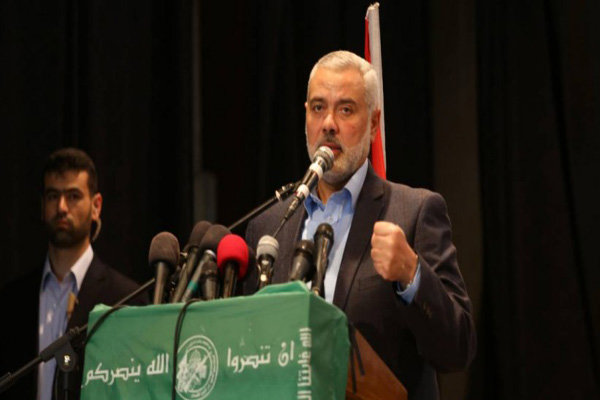Hamas leader to visit Iran amid Qatar row

TEHRAN – The Palestinian movement Hamas said on Saturday that a delegation headed by its leader Ismail Haniyeh will visit Iran in the near future as the Saudi-led squeeze on its main supporter Qatar is expected to exacerbate.
The delegation is scheduled to make visits to several other countries as well, the Hebrew language Walla quoted Osama Hamdan, a senior Hamad official, as saying.
Hamdan did not provide details.
The news comes days after Saudi Arabia, the United Arab Emirates, Egypt, Bahrain, Yemen and the Maldives severed all diplomatic relations with Qatar, a main backer of Hamas.
The Saudi kingdom made the surprise announcement on Monday, saying that it was taking action for what it called the protection of national security.
Monday’s diplomatic moves came a fortnight after four Arab countries blocked Qatar-based media over the appearance of comments attributed to the Qatari emir that praised Iran. Qatar said hackers had taken over the website of its state-run news agency and faked the comments.
The announcement accused Qatar of "harboring a multitude of terrorist and sectarian groups that aim to create instability in the region".
Qatar vehemently denies the accusations.
On Tuesday, Saudi Arabian Foreign Minister Adel Al-Jubeir conditioned restoration of ties with Qatar upon it taking several steps, including ending its support for the Palestinian group Hamas and the Muslim Brotherhood.
Hamas was formed in the 1980s as an offshoot of the pan-Arab Brotherhood but has more recently stressed its basis as a Palestinian liberation movement, in part to defuse Egyptian enmity and draw support from wealthy Arab states.
In a separate development, Bahraini Foreign Minister Sheikh Khalid bin Ahmed al-Khalifa told the Saudi-owned Asharq al-Awsat newspaper that the conditions posed by the four countries for a resolution of the crisis were "crystal clear".
"Qatar has to redress its path and has to go back to all previous commitments, it has to stop media campaigns and has to distance itself from our number one enemy, Iran," he said.
Moves by Saudi Arabia, Egypt and other Arab states to isolate Qatar may have serious consequences for Hamas, which has long relied on the tiny Persian Gulf state for financial and political support.
Qatar has invested hundreds of millions of dollars to build roads, houses, schools and clinics in impoverished Gaza, which Hamas seized its control from the rival Palestinian movement Fatah in 2007.
As well as financial support, Qatar has long hosted exiled Hamas officials, including its former political chief Khaled Meshaal since 2012, who was recently succeeded by Ismail Haniyeh.
Reacting to the blockade, Hamas said it felt “deep regret and disapproval” at the Saudi statement.
“These statements are a shock to our Palestinian people and to our Arab and Islamic nation, which considers the Palestinian cause its central cause,” the statement said.
Washington has reacted confusingly.
U.S. Secretary of State Rex Tillerson, while praising Qatar's emir for working to limit the funding of terror groups, said more needed to be done.
Meanwhile U.S. President Donald Trump has accused Qatar of funding terrorism, and urged it to stop.
"I decided with Rex Tillerson that the time had come to call on Qatar to end funding and extremist ideology in terms of funding," he said.
President Trump had previously tweeted support for the move to isolate Qatar over its alleged financing of extremist groups.
While the Syrian crisis has driven a wedge between Tehran and Turkey since 2011, the rift between Arab caliphates have led them into an ad-hoc alliance that some believe represents the best chance to mend fences.
Turkey and Iran back Qatar and have links with the Muslim Brotherhood.
“Neighbors are permanent; geography can't be changed. Coercion is never the solution. Dialog is imperative, especially during blessed Ramadan,” Iranian Foreign Minister Mohammad Javad tweeted, reacting to the development.
On Wednesday, Zarif made an unannounced visit to Turkey, holding talks with Turkish President Recep Tayyip Erdogan and his opposite number Mevlut Cavusoglu.
Iran sent the first food cargo to Qatar, according to Iranian media outlets on June 8.
Also, Turkish President Recep Tayyip Erdogan voiced support for Qatar on Tuesday, saying he intends to "develop" ties with the embattled state hit by sanctions from Saudi Arabia and its allies.
"Let me say at the outset that we do not think the sanctions against Qatar are good," Erdogan said in a speech in Ankara.
"Turkey will continue and we will develop our ties with Qatar, as with all our friends who have supported us in the most difficult moments," he added in reference to last year's failed coup.
In a sign of support for tiny Arab country, Turkey's parliament approved a legislation on Wednesday, allowing its troops to be deployed to a Turkish military base in Qatar.
The foreign minister of Bahrain arrived in Ankara on Saturday to discuss the issue.
AK/PA
Leave a Comment